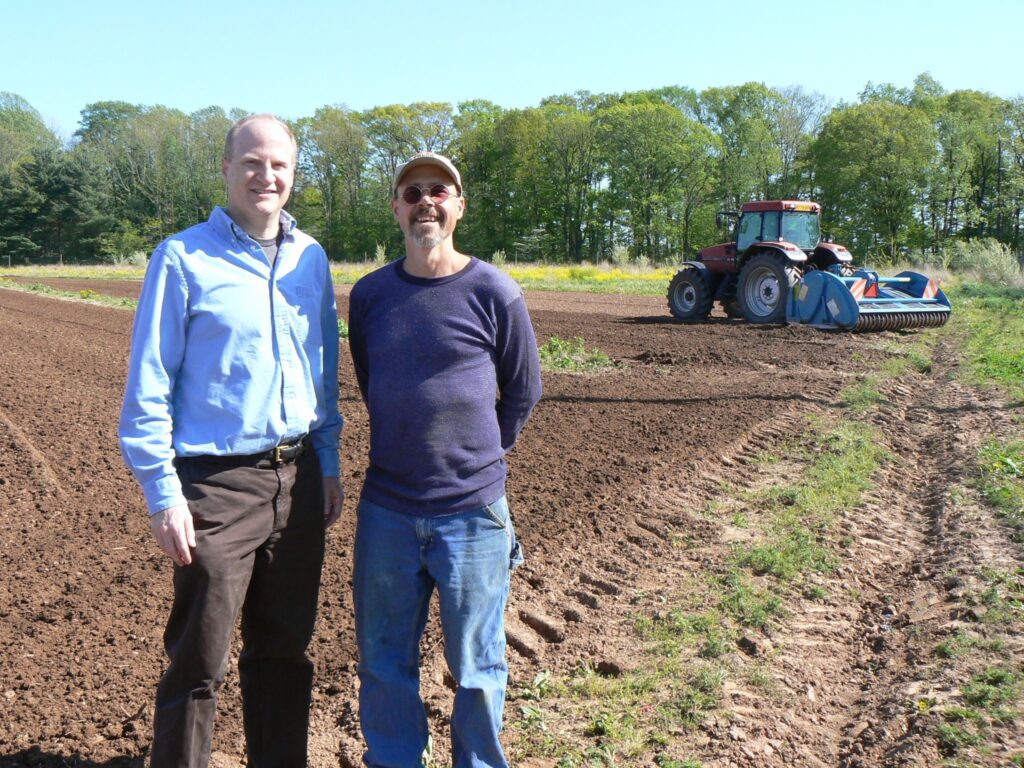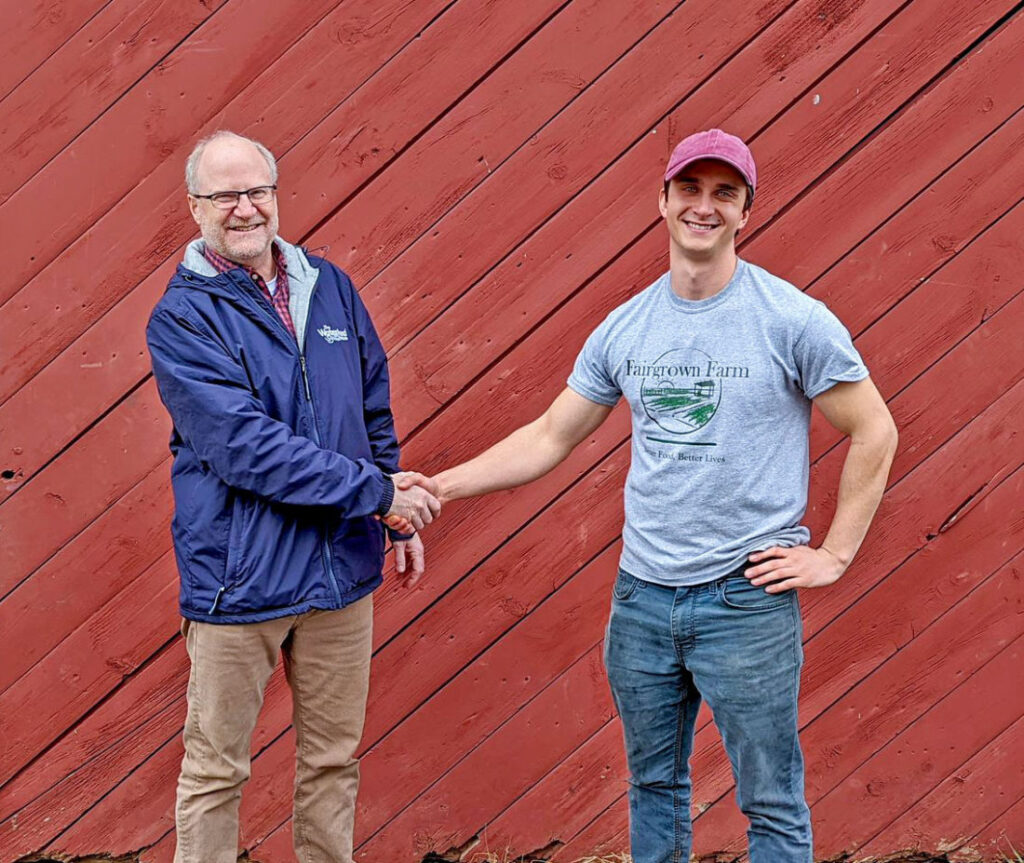A Legacy of Farming in Hopewell Township…
The Watershed Farm on Wargo Road has been growing organic produce in Hopewell Township (Pennington) since 1982. Originally, the farm was started by The Watershed Institute, then management transferred to Jim Kinsel of Honey Brook Organic Farm who grew it into the largest CSA in the state (and possibly the country). Honey Brook farm left the Watershed in 2020 and the property was vacant for 2 years.
In Fall of 2022, we approached The Watershed Institute about renting the farm and quickly moved in over winter.
The plan for our first year (2023) is to actively farm 10 acres, bring the land back under Organic certification, and host a CSA pickup twice per week. We look forward to working closely with the Watershed Institute and continuing the farm’s long legacy of responsible land management!


History of Agriculture at the Watershed Institute Reserve
(credit: The Watershed Institute)
The land now known as The Watershed Institute Reserve has been farmed since at least the
second quarter of the 1700s. A farm was first established on this land by John Drake and was
occupied for more than 150 years by six generations of the Drake family. (Hunter Research, Inc.,
which conducted research on the farm has submitted a nomination for listing a portion of the
land on the National and State Historic Registers of Historic Places.) Four other families owned
and operated the farm between 1908 and 1940, during which time at least three other individuals
leased the land as tenant farmers.
Renowned humanitarian Muriel Gardiner Buttinger and her husband Joseph purchased the then197-acre farm in 1940 and bought additional land thereafter. The Buttingers eventually donated 400 acres to the Watershed, which was known then the Stony Brook-Millstone Watershed Associations. In the 1970s when much of the land was donated, approximately 90 acres of that land was maintained in field crops and the Watershed collected annual rental payments from farmers on that land until the late 1980s. In 1977, Dr. Buttinger donated funds to the organization to purchase the 88-acre Wargo Farm, located east of Wargo Road. That purchase expanded the land under the Watershed’s management to 488 acres, of which approximately 150 acres was under agricultural management, mostly alfala that was grown for hay. Another 50 acres (much of which was also farmed) was retained by Dr. Buttinger until her death in 1985 when it was gifted to the Watershed. (Figure 1 shows the extent of farming on these lands in 1982).
Figure 1: Map shows then 488-acre Watershed Reserve in 1982. At the time, approximately 150 acres was farmed.
Creation of Organic Farm at the Watershed
In 1982, the Watershed initiated a process to evaluate options for managing the farmland. That
process resulted in a 1983 plan to modify practices on at least a portion of the agricultural land to “demonstrate cost-effective farming methods that create environmental benefits and limit
environmental harm.” The organization hired a consultant to refine the plan and launch a
fundraising effort to support the new initiative. Grants from the Geraldine R. Dodge Foundation,
Robert Wood Johnson Charitable Trust, Fund for New Jersey, and David McAplin, Sr. were
secured, allowing the organization to hire a Farm Manager (Meg Cadoux), construct fencing
around approximately 15 acres, improve the soils, plant crops and make improvements to the
farmstead on Wargo Road. The goal was to transition that area from hay to organic vegetables
and fruits. Soon thereafter, Cadoux moved to New Hampshire to marry Garry Hirschberg, who
founded Stonyfield Yogurt Co. A second Watershed-employed Farm Manager (Al Johnson) to
grow produce as well as sheep and chickens. Farm products were sold at a farmstand at the
Wargo Road location and to several restaurants in the region. Johnson was an early leader of the Northeast Organic Farming Association of New Jersey.
In 1988, the Watershed determined it would shift the focus of the organic farm from
“demonstration, education and research” to “self-sufficiency and economic viability.” That same
year, the farmer who had been paying the Watershed to grow and harvest hay on the property
chose not to extend his lease. For several years the organization found individuals to cut hay on
the property at no cost to them when it was still deemed necessary to do so to avoid a large tax
bill on the property.
In 1990, Jim Kinsel entered into an agreement with the Watershed to develop an independent
organic farm under lease to the organization. Kinsell grew his enterprise dramatically through a
Community Supported Agriculture (CSA) model and the Watershed entered into two additional
lease agreements with him and, eventually, his wife and business partner Sherry Dudas. Over the
course of three decades, the enterprise grew to a maximum of 76.4 farmed acres on the
Watershed land and three thousand members; for a time it was thought to be the largest organic
CSA in the country. It was known as the Watershed Organic Farm until the early 2000’s, when
it was renamed Honey Brook Organic Farm. Honey Brook was one of the first operating organic
farms in NJ and was the oldest certified organic CSA in the State, garnering wide acclaim.
The last lease arrangement between the two parties, for the period beginning January 1, 2010,
included approximately 93 acres and the buildings at the Wargo Road farmstead. (Figure 2
shows the area leased by Honey Brook Organic Farm, deer fencing and buildings). Kinsel and
Dudas ceased farming at the Watershed after the 2020 growing season.
Figure 2: Map shows extent of 2010 area leased to Jim Kinsel (green line).
